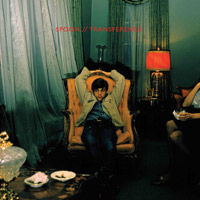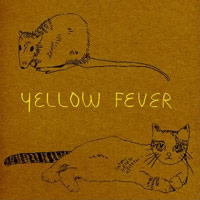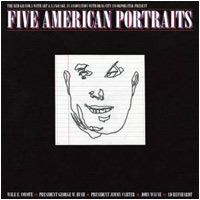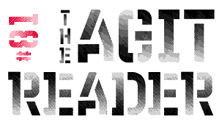
Transference
Merge
With Spoon, if there’s one thing that’s certain, it’s uncertainty. The scrappy Texas band pulled themselves up by their boot straps some years back to become the greatest indie rock success story this side of (labelmates) Arcade Fire. The divergent sounds of Girls Can Tell and Kill the Moonlight both rightfully made some best of the decade lists recently, but the band remained fluid between and following those records, altering ratios and applied pressure within their equation of ashen soul and hotwired indie rock. Even after their greatest widespread success—with the middling Gimme Fiction—Britt Daniel and his cohorts continued to tinker with that sonic composition, coming up with all sorts of winning formulas on Ga Ga Ga Ga Ga, the band’s last record and a return to form of sorts.
So it’s obviously wise not to have too many expectations when approaching Transference. This is doubly true as it’s the first time Spoon has recorded on its own. The band has whittled down everything in the mix to just the essentials, keeping the songs lean and seemingly underfed to a degree. The results are as varied as the songs themselves. The record’s first cut, “Before Destruction,” consists of just a few elements—a high hat and a bass drum, an acoustic guitar, and a budget keyboard whine—backing Britt’s no-frills vocals. It feels anemic, especially when not having a real hook either lyrically or musically. “Is Love Forever?” has a fuller complexion and what resembles a chorus, and the difference is palpable. But even the album’s first single, “Written in Reverse,” seems underdone, unrefined guitar lines meshing haphazardly with the clatter of drums and Daniel’s scratched coo.
In some ways Transference has the feel of a Guided By Voices album, in a fidelity be damned, “first idea, best idea” sort of way. But where Pollard would create 20-some two-minute pop songs out of the flotsam and jetsam, Daniel has tried to stretch each vague idea and snippet of a riff out to four minutes. That “Trouble,” which has the sound of a four-track cassette and, at three minutes, is the album’s shortest song, sounds the most cohesive, makes this all the more apparent. Transference is 45 minutes of material that sounds like Spoon songs—only they’re not songs yet, just the first impressions of some.
Stephen Slaybaugh

Astro Coast
Kanine
A recent bar conversation turned to states that no one associates with good bands—and Florida was the example. A Wikipedia search shows that some of the worst bands ever are from the Sunshine State: adult-contemporary purveyors of bland Matchbox Twenty, emo whiners Dashboard Confessional and pop-punk embarrassments New Found Glory. But we forgot that Surfer Blood is from West Palm Beach, and this much-buzzed about indie band’s debut, Astro Coast, just may be able to redeem its native land for some of its previous crimes against music.
General blog consensus may be that the band owes it sound to the ’90s, but while the slacked, distorted guitar of “Floating Vibes” may recall Smashing Pumpkins or Sonic Youth, if John Paul Pitts’ voice belongs to any decade, it’s the ’80s. Something about his near-falsetto as he pleads and professes “I won’t wait around for you to figure it out” on the haunting “Harmonix” lends a touch of Brat Pack movie soundtrack, especially when paired with that ringing guitar sound. But the theme throughout Surfer Blood’s debut is that the band consistently defies comparisons. Just when you’re about to feel comfortable enough saying the band sounds like someone, the song turns into something else or throws you off-kilter with a change in guitar or vocal sound. “Swim (To Reach the End”) is an appropriately wavy ride—it immediately sweeps you up into its powerful, anthem-like chorus, then gently sets you down in an intricately woven interlude before the chorus returns. “Twin Peaks” is as unpredictable as the TV show, but definitely more fun, with an energetic beginning, before Pitt switches to a high lament. “Catholic Pagans” is a ’50s-infused love song, mismatched to lyrics, “Never could be still for long and I could never hold a job, coupled with a weakness for cocaine and liquor.”
Despite some water-themed songs titles and the band’s name, this isn’t a beachy band of surfers a la Japanese Motors. The band doesn’t surf, and they recorded Astro Coast in their dorm room at Florida Atlantic University. Surfer Blood proves that it’s not impossible for good music to emerge from Florida (or anywhere for that matter), it’s just a little more remarkable when it does.
Josie Rubio

There Is Love in You
Domino
Kieran Hebden has been recording abstract electronic music under the moniker Four Tet for more than 10 years now. His breakout record, Rounds, though clearly headphone music, showcased a symbiotic relationship between melody and experimentation that pleased open-minded pop fans and audiophiliacs alike. His follow-up, Everything Ecstatic, was less catchy but made up for it with aggressive and unpredictable rhythms that brought him closer to jazz than electronica. And now, with There Is Love in You, Hebden takes a step that goes neither forward nor backward. The live percussion that has always been a staple of Hebden’s work is largely muted here, overrun by computerized noises and processed female vocals. But while the album doesn’t sound quite like anything Hebden has done before, it doesn’t exactly break any new ground either. Instead, There Is Love in You is a minor, yet agreeable, entry to the Four Tet discography that probably won’t win over any new fans, but is also unlikely to alienate his long-time listeners.
Highlights include the dense eight-bit sound collage, “Sing,” the coldly catchy “Plastic People” and first single “Love Cry,” which is the closest the bedroom laptop enthusiast has ever come to making a club track. But the album peaks on closer “She Just Likes to Fight.” Here, plaintive clean electric guitar tracks are layered on top of one another over subtle bell percussion and a variety of diverse synth lines. It would be the perfect backdrop for some indie troubadour’s lovelorn lyrics if it didn’t evoke feelings of loss and regret so perfectly without any words at all. Hebden’s ability to use computerized and organic instrumentation to say more than a thousand would-be poets is his greatest strength, and one he hopefully continues to cultivate on future releases.
David Holmes

Yellow Fever
Wild World
Given that the Vivian Girls are still considered upstarts releasing records on labels still considered upstarts (In the Red notwithstanding), it might come as a cumbrous endeavor for the trio to curate their own boutique imprint. Wild World is sure to have some naysayers for it’s overly precious, overtly do-it-yourself modus operandi, and even if the label’s debut release by Austin’s Yellow Fever teeters staunchly between minimalist pop and twee punk, there’s an ever present intrigue in the duo’s songcraft, a melodious thread that could exist sans bass and drums. Obvious nods go out to the Young Marble Giants here, as the stoic approach they apply to a very narrow hallway of the post-indie microcosm barely registers above a whisper. Even when a chorus of voices or a guitar enters the mix, like on “Alice,” the situation seems subdued to the point of indifference.
Though Jennifer Moore is the spitting image of Stereolab’s Laetitia Sadier, with an icy elegance and cadence, her surroundings, usually only a rhythm section of strictly black and white, are of sucrose origins but steely in stance and motion. That contrast is a tin-foil sweetness, especially on the quieter moments of “Ratcatcher” and “Culver City,” imagining Pod-era Breeders on starker terrain. Coming from the Vivian Girls camp, Yellow Fever might become victims of their own casualness. It’s simple pop, with few props and little in the way of variety. But parsing through their veneers and indulging in the witty swagger of “Donovan” (a tribute to Mr. Mellow Yellow) or the airy grunge-lite sing-a-long of “Psychedelic” reveals a cleverness that tends to elude their benefactors.
Kevin J. Elliott
MP3: “Hellfire”

Eggs
Friendly Fire
One step away from the Europop, electro bounce of their previous work, Oh No Ono’s latest effort, Eggs, is a pretty enormous mission statement. A band once known for little more than cheeky vocoders and a smirk have delivered a record that’s heavy on the grandeur and light on the frivolity. Songs like the closer, “Beelitz,” coast at an operatic level, allowing heavenly choirs, bulldozer symphonies, and a show-stopping vocal solo to trade off the limelight unselfishly.
It can actually get a little dizzying. With the constant meteoric showering of orchestral twinkles and studio-induced eccentricities, the music can inadvertently fall down its own rabbit hole, losing direction, and more importantly, definition, while the rest of the instrumentation is mired in the very weirdness it strives to create. It’s a problem born out of ambition rather than incompetence, but it is one that significantly hampers the album as a whole.
All that being said, it’s clear that Eggs must’ve been incredibly difficult to perform. The songs rely on taut, near-mystical precision throughout their orbit, and for a meager five-person collective like Oh No Ono, it’s a rightfully acclaimed proficiency. But with Sir Longstretch and his merry band of Dirty Projectors creating that same sort of compositional depth with the honest-to-god music to back it up, Eggs looks awfully small in comparison. It’s worth a passing glance, but that should be while going in the opposite direction.
Luke Winkie
MP3: “Helplessly Young”

You & Me
Gnomonsong
If you happen to be one of those self-conscious indie dudes who still can’t admit to liking the Grateful Dead, Vetiver’s Kevin Barker may have saved you some trouble. Then again, the whole freak-folk scene, My Morning Jacket, Wilco and countless other “tastemaker approved” contemporaries should have made it safe for those proverbial skeletons (pun intended) to come out of the closet long ago. If one can’t acknowledge their inner Deadhead this late in the alt-folk game, they probably won’t be able to find anything on Barker’s You & Me to appreciate. It would be their loss, as Barker enlisted a host of his friends to create an enjoyable and organic record.
“Little Picture of You,” a wonderful Garcia-esque duet, opens the album and lays down the free-grazing landscape that eventually prevents the eight songs from forming a more cohesive work. It’s no real surprise that the final product is simultaneously well performed and loosely strung together, though, as this dynamic reflects the cast of characters in rotation, including Joanna Newsom, Otto Hauser (of Vetiver) and the Fruit Bats’ Eric Johnson. Guitar ditties like “Amber” and “My Lady” are sure to please fans of Barker’s gig in Vetiver, as these tunes don’t stray too far from Andy Cabic’s backyard groove sensibilities. In the end, the coast is clear for anyone with or without tie-dye or a headband to check this one out, but bare feet do help the cause.
Phil Goldberg
MP3: “You & Me”

Real Life Is No Cool
Smalltown Supersound
We could spend some time in this review talking about Balearic house and the effect of the chilly Norweigian weather on Lindstrøm’s soundscapes, and shit like that. Instead, though, let’s get down to brass tacks and talk about two pop gods—Michael Jackson and Prince—because they’re all over this album. It might as well be called a tribute record.
Michael’s basslines color “Looking for What,” while the improvised lyrics (“Girl take off your shoes and feel free”) sound like a direct quote from some unreleased, purple-era, Prince sex-epic. However, the pop eventually drains out the backend, and the album-opener gets spacey and sinister in the last 90 seconds.
“Baby Can't Stop” will probably get the most attention of anything on the record, since it’s essentially a mash-up of “Wanna Be Startin’ Somethin’” and “Don’t Stop ’til You Get Enough” with not-quite-new vocals from Christabella (formerly known as Solale). Once again, the song breaks down and transforms in its last moments, as Lindstrøm can’t resist noodling and deconstructing his own pop impulses.
“High & Low” and “Keep It Up” are the two tracks that seem to have escaped from the Paisley Park vaults. On the latter, that crystalline synth setting, still unredeemed from its dominance on 1999, creates a strange innocence when paired with the kind of sexually reverent lyrics on which the Purple One could once claim a monopoly. “You could cry. I could die. This real life. Is no lie. I could get it up. Keep it up. Get down. Deep. Deep down.” While “So Much Fun” is like one of those Revolution jams where Prince let Sheila E. lead the band and he just stood in the back and played guitar. You can dance to this music, sure, but it seems Lindstrøm & Christabella, like his majesty, would prefer it for more prurient use.
So, is it good? I guess that depends on your outlook. It’s certainly very well made. If your take is cynical, then Real Life Is No Cool totally proves that kitsch is a cultural deadend, leading to an endlessly repeating loop of sameness. If you’re a little more optimistic, it proves there’s no such thing as finished culture, and anything can be made new again.
Matt Slaybaugh

Five American Portraits
Drag City
Mayo Thompson is the weird uncle of American psychedelic rock, always to be remembered and noted in any conversation about freaky people making mystic music in the States. However, must it always be such a challenge (or a burden) to actually listen to the songs? Thompson’s solo record, Corky's Debt to His Father, and the Red Krayola’s first LP, The Parable of Arable Land—these are great records on paper. They are records you can site to one-up your friend who says she’s intimately familiar with the 13th Floor Elevators, but can they actually stand up to repeated listening? Are they just impractical historical artifacts like the guns of the pioneers? Once the “movement” has scalped its guru, is the guru’s following work moot? I’m of the opinion that it is important to respect one’s accomplished elders, but that does not mean that every egg they lay is a golden one.
Five American Portraits is exactly what is presented here, only in musical form. The lyrics, half spoken, half sung in prose describing in intricate, almost agonizingly brushstroke detail portraits of the eponymous subjects (Wile E. Coyote, President George W. Bush, President Jimmy Carter, John Wayne, and Ad Reinhardt), are the weakest point of this record. The music is jazzy and moody and very palatable to any ear versed in Jim O’Rourke’s solo work, or for that matter, Corky’s Debt-era Thompson. The obvious concept of the album—to blend visual art and aural art—ends up being more of an instruction book to copy the paintings involved than an actual exploration of painting with words. Thompson’s vocal delivery is familiar, but the lyrics are so dull in their tedious description, especially compared to some of his more heartfelt verse on previous records. This is a record worth hearing—especially for fans of Thompson’s other work—but repeated listens quickly prove these Five American Portraits as lesser works.
Michael P. O’Shaughnessy
MP3: “Portrait of Wile E. Coyote”
ALBUM REVIEWS
Dragonette, Fixin to Thrill
Owen Pallett, Heartland
Freedy Johnston, Rain on the City
Joyful Noise
The King Khan & BBQ Show, Invisible Girl
The Dry Spells, Too Soon for Flowers
Animal Collective, Fall Be Kind EP
Trans Am, What Day Is It Tonight?
Goldspot, And the Elephant Is Dancing
The Gaslamp Killer, All Killer
Brimstone Howl, Big Deal. What's He Done Lately?
Dragon Turtle, Almanac
Deer Tick, More Fuel for the Fire EP
Kitsuné Maison's Compilation 8
